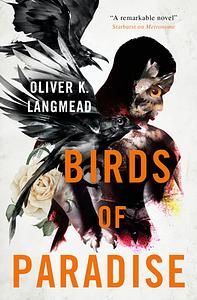You need to sign in or sign up before continuing.
Take a photo of a barcode or cover
Summary: Birds of Paradise stars Adam, the first man, as he joins with the animals he helped name to recover pieces of the garden of Eden in the present day. It is a beautiful exploration of death, grief and immortality, and probably the best book I’ve read so far this year.
-Recommended for those who enjoyed Neil Gaiman’s American Gods
-Not recommended if you want an upbeat read
-Recommended if you like books with a strong emotional core
-Not recommended if you cannot read books that include violence against animals
Birds of Paradise opens with a strong one-two punch. First, Adam and Eve exchange their own beating hearts in the garden of Eden. Then cut to the present, where Adam, working as a bodyguard, brutally murders someone harassing his starlet client. From there, Adam is saved from prison by his friend Raven, who acts as a lawyer and fixer for the remaining refugees from the garden of Eden (in this novel, all the animals from the garden of Eden can move from animal to human form, as well as a form that is a mix of both). Along with haunted Crow and bestial Owl, he is sent to the UK to find Magpie, who’s been spending a fair amount of Corvid and Corvid’s (a law firm ran by Raven) funds.
Adam is a broken, weary man. Many of his memories are hidden behind thorns of grief, brought on by the deaths of his friends, the original animals in the garden of Eden. Since they are all immortal, they can only be killed through violence, inevitably by Adam’s own descendants, the men and women that walk the earth. He spends much of the book in a haze, occasionally recalling some distant memory. I found it hard to connect with Adam at first – for the early sections of the book, he is merely going through the motions. Once I started to understand the motivations behind his grief and rage things clicked into place. When he finds that Magpie is collecting pieces of the garden of Eden, he becomes more driven – although he never truly shakes off the haze of sorrow. Given his experiences, it would have felt cheap for him to do so.
The supporting characters are where this book shines – Magpie is an absolute delight, mercurial and whimsical, yet deeply driven underneath. Raven, Crow and Owl are all well realised too, coming in and out of the story as things progress. Some of the animals we meet later are also firm favourites of mine. It’s especially impressive that with each character you feel the impact of the millennia upon them, and each is affected in different ways by the time. They’ve all had to live many, many different lives to avoid being noticed as immortals (facilitated by Corvid and Corvid).
The antagonists in this story, are of course, the people. Specifically a group of older rich people lead by a couple called Mr and Mrs Sinclair. These people covet the pieces of Eden, and believe strongly in the idea of man’s dominion over beast. They are resourceful and ruthless, and Adam has to find himself defending both the pieces of Eden and the creatures of Eden from them.
There’s something about the tone of the book that really drew me in – this perfect interweaving of mythic and mundane. At times the story feels biblical, in the way that the old testament stories might be interpreted today, all wrath, and pain and sacrifice. The only thing missing is God, which the book neatly sidesteps, although the implication is given that God left the beings of earth to their own devices once the apple was eaten.
I’m not sure if I’ve done this book justice in my review, but as one of my final thoughts, I’ll say this – I was drawn in emotionally to the characters on a very visceral level, which happens rarely for me. In particular the final chapters brought tears to my eyes, with a catharsis that, if not revelatory, was perfectly framed to impact me in just the right way.
I absolutely loved Birds of Paradise, only let down in that the beginning that was slower to grab me than I would have liked. It’s at different times thoughtful, visceral, touching and whimsical, effortlessly shifting and mixing in a result that resonated with me strongly. I would recommend Birds of Paradise to pretty much anyone.
Rating: 9/10
Thanks to Netgalley and Titan Books for providing me with an e-arc copy of this book in exchange for an honest review.
For reviews like this and more visit my blog
-Recommended for those who enjoyed Neil Gaiman’s American Gods
-Not recommended if you want an upbeat read
-Recommended if you like books with a strong emotional core
-Not recommended if you cannot read books that include violence against animals
Birds of Paradise opens with a strong one-two punch. First, Adam and Eve exchange their own beating hearts in the garden of Eden. Then cut to the present, where Adam, working as a bodyguard, brutally murders someone harassing his starlet client. From there, Adam is saved from prison by his friend Raven, who acts as a lawyer and fixer for the remaining refugees from the garden of Eden (in this novel, all the animals from the garden of Eden can move from animal to human form, as well as a form that is a mix of both). Along with haunted Crow and bestial Owl, he is sent to the UK to find Magpie, who’s been spending a fair amount of Corvid and Corvid’s (a law firm ran by Raven) funds.
Adam is a broken, weary man. Many of his memories are hidden behind thorns of grief, brought on by the deaths of his friends, the original animals in the garden of Eden. Since they are all immortal, they can only be killed through violence, inevitably by Adam’s own descendants, the men and women that walk the earth. He spends much of the book in a haze, occasionally recalling some distant memory. I found it hard to connect with Adam at first – for the early sections of the book, he is merely going through the motions. Once I started to understand the motivations behind his grief and rage things clicked into place. When he finds that Magpie is collecting pieces of the garden of Eden, he becomes more driven – although he never truly shakes off the haze of sorrow. Given his experiences, it would have felt cheap for him to do so.
The supporting characters are where this book shines – Magpie is an absolute delight, mercurial and whimsical, yet deeply driven underneath. Raven, Crow and Owl are all well realised too, coming in and out of the story as things progress. Some of the animals we meet later are also firm favourites of mine. It’s especially impressive that with each character you feel the impact of the millennia upon them, and each is affected in different ways by the time. They’ve all had to live many, many different lives to avoid being noticed as immortals (facilitated by Corvid and Corvid).
The antagonists in this story, are of course, the people. Specifically a group of older rich people lead by a couple called Mr and Mrs Sinclair. These people covet the pieces of Eden, and believe strongly in the idea of man’s dominion over beast. They are resourceful and ruthless, and Adam has to find himself defending both the pieces of Eden and the creatures of Eden from them.
There’s something about the tone of the book that really drew me in – this perfect interweaving of mythic and mundane. At times the story feels biblical, in the way that the old testament stories might be interpreted today, all wrath, and pain and sacrifice. The only thing missing is God, which the book neatly sidesteps, although the implication is given that God left the beings of earth to their own devices once the apple was eaten.
I’m not sure if I’ve done this book justice in my review, but as one of my final thoughts, I’ll say this – I was drawn in emotionally to the characters on a very visceral level, which happens rarely for me. In particular the final chapters brought tears to my eyes, with a catharsis that, if not revelatory, was perfectly framed to impact me in just the right way.
I absolutely loved Birds of Paradise, only let down in that the beginning that was slower to grab me than I would have liked. It’s at different times thoughtful, visceral, touching and whimsical, effortlessly shifting and mixing in a result that resonated with me strongly. I would recommend Birds of Paradise to pretty much anyone.
Rating: 9/10
Thanks to Netgalley and Titan Books for providing me with an e-arc copy of this book in exchange for an honest review.
For reviews like this and more visit my blog
ARC provided by Netgalley in return for an honest review.
Adam is the First Man, undying and aimlessly wandering around the world in search for meaning and a sense of peace. He lives many lives, essentially always alone, save from his brief encounters with other former residents of Eden: the animals that Adam named like Pig, Crow, Magpie, and Butterfly.
During the course of Langmead's novel, Adam travels around Scotland to find more scattered pieces of his lost Eden, as well as recovering some of his lost memories and reconnecting with his past. Langmead's prose is evocative and beautiful and Adam is a narrator in the tradition of American Gods' Shadow, private and contemplative, hardly the action hero that his built and physicality might lead someone to expect. Langmead, I think, handles the character type better than Gaiman did. When Adam feels distant, it is only highlighting his isolation and loneliness, the grief of his continuous existence, the aimlessness of living through age after age of a changing world.
I did not expect that this book would make me cry. It did. But it was also full of hope.
Adam is the First Man, undying and aimlessly wandering around the world in search for meaning and a sense of peace. He lives many lives, essentially always alone, save from his brief encounters with other former residents of Eden: the animals that Adam named like Pig, Crow, Magpie, and Butterfly.
During the course of Langmead's novel, Adam travels around Scotland to find more scattered pieces of his lost Eden, as well as recovering some of his lost memories and reconnecting with his past. Langmead's prose is evocative and beautiful and Adam is a narrator in the tradition of American Gods' Shadow, private and contemplative, hardly the action hero that his built and physicality might lead someone to expect. Langmead, I think, handles the character type better than Gaiman did. When Adam feels distant, it is only highlighting his isolation and loneliness, the grief of his continuous existence, the aimlessness of living through age after age of a changing world.
I did not expect that this book would make me cry. It did. But it was also full of hope.
*Much thanks to NetGalley and Titan Books for granting me access to an ARC of this book*
Why I Read It: This title had been floating around and I finally read the synopsis. The idea sounded cool, taking biblical origin stories and giving them a modern twist in the same vein as American Gods. While I don't like American Gods, I like the idea behind it so I was curious to see how I would feel about this one.
What It's About: After his removal from Eden, Adam continues to aimlessly walk the Earth as a shadow of his former self. One day, he gets recruited by his former animal companions in Eden to find the missing pieces of Eden and reassemble them, however, they are not the only ones looking.
Cons: All the people in this story, I didn't like. The side characters are so minor, I couldn't give any sort of description about them outside of their names. The protagonist, Adam, and the villains, were the only ones that stood out, and not in a good way. While both fit their roles well, Adam being a centuries old, world weary, psychopath and the villains being from old money, that doesn't mean they are enjoyable to read from. On top of the characters being unpleasant, there is also a general lack of story drive. Despite the high stakes, there is a lack of urgency for 2 reasons, that the story almost entirely takes place in the United Kingdom where only 2 pieces are retrieved, and that there is more time spent focusing on Adam's brooding and violent outbursts, in a non productive way. This unlikeability of characters mixed with a general absence of plot makes for a rather unsatisfying ending.
Pros: There were small scenes just about gardening, because that brings peace to Adam, and I found those to be serene and wish there was more of them. Adam's relationship with Eve felt very raw and genuine, and their scenes together were also ones I enjoyed, except for the reveal about Eve at the end. Also, there was the subtle theme of racism scattered throughout the narrative, in who the antagonists address Adam and who they view themselves as superior and entitled to Eden. Unfortunately, this wasn't a major story line in the narrative.
Finishing Thoughts: I think this book had epic aims, and did stand out with a unique premise, but this ultimately ended up being about nothing and for no one.
Why I Read It: This title had been floating around and I finally read the synopsis. The idea sounded cool, taking biblical origin stories and giving them a modern twist in the same vein as American Gods. While I don't like American Gods, I like the idea behind it so I was curious to see how I would feel about this one.
What It's About: After his removal from Eden, Adam continues to aimlessly walk the Earth as a shadow of his former self. One day, he gets recruited by his former animal companions in Eden to find the missing pieces of Eden and reassemble them, however, they are not the only ones looking.
Cons: All the people in this story, I didn't like. The side characters are so minor, I couldn't give any sort of description about them outside of their names. The protagonist, Adam, and the villains, were the only ones that stood out, and not in a good way. While both fit their roles well, Adam being a centuries old, world weary, psychopath and the villains being from old money, that doesn't mean they are enjoyable to read from. On top of the characters being unpleasant, there is also a general lack of story drive. Despite the high stakes, there is a lack of urgency for 2 reasons, that the story almost entirely takes place in the United Kingdom where only 2 pieces are retrieved, and that there is more time spent focusing on Adam's brooding and violent outbursts, in a non productive way. This unlikeability of characters mixed with a general absence of plot makes for a rather unsatisfying ending.
Pros: There were small scenes just about gardening, because that brings peace to Adam, and I found those to be serene and wish there was more of them. Adam's relationship with Eve felt very raw and genuine, and their scenes together were also ones I enjoyed, except for the reveal about Eve at the end. Also, there was the subtle theme of racism scattered throughout the narrative, in who the antagonists address Adam and who they view themselves as superior and entitled to Eden. Unfortunately, this wasn't a major story line in the narrative.
Finishing Thoughts: I think this book had epic aims, and did stand out with a unique premise, but this ultimately ended up being about nothing and for no one.
I cried, loved it, rooted for the characters and felt a lot of different emotions.
I requested this arc because I'm a fan of Gaiman and I got more than I bargained because it's excellent and unique.
A great and poignant story, excellent world building and character development.
It's a book that I strongly recommend because it's so brilliant.
Many thanks to the publisher and Netgalley for this ARC, all opinions are mine
I requested this arc because I'm a fan of Gaiman and I got more than I bargained because it's excellent and unique.
A great and poignant story, excellent world building and character development.
It's a book that I strongly recommend because it's so brilliant.
Many thanks to the publisher and Netgalley for this ARC, all opinions are mine
“ I can’t sleep. If I sleep, I’ll die, and I’ll wake up dead.”
I would like to thank Titan Books for providing me an e-copy of this book via Netgalley in exchange for an honest review.
Birds of Paradise is a refreshing retelling of the Bible's Adam and Eve story that is likened to [b:American Gods|30165203|American Gods (American Gods, #1)|Neil Gaiman|https://i.gr-assets.com/images/S/compressed.photo.goodreads.com/books/1462924585l/30165203._SY75_.jpg|1970226]. Together with its summary and gorgeous cover, it made me curious enough to check this book out. Having read and enjoyed American Gods, the similarities between them were definitely present, and it was even uncanny to read how the books' elements were almost comparable. But of course, Birds of Paradise had its own set of unique twists that made it entirely different from American Gods.
Set in a world wherein the Garden of Eden is real, and Adam has been living many different lives for the past millenniums, he suddenly finds himself in an unexpected journey together the remaining original animals from God's creation, and restore the Garden of Eden. It definitely took heavy roots from the Biblical story, but it wasn't overwhelming and overpowering in its religious core.
This beautiful dark book is just full of grief, loss, yet still has smidges of life, hope, loyalty, and friendship woven into it. The themes, tone, and atmosphere of the book were such a match to the story, and the writing style was almost lyrical in a way. There were a handful of times that it felt a bit clunky to me, but it didn't really stir me further away from the story.
My only critique for this book would probably be the way the pacing of the story was handled, and how I felt like the climax and ending parts were too rushed. I would have really liked if some portions of the book were fleshed out a bit more, and to make it an even more well-rounded story. If that certain scene was nailed a tad bit more, I would have enjoyed it so much.
Nevertheless, this book was a pretty entertaining read, and I would still recommend this to any readers, especially for those who are fans of Neil Gaiman's American Gods.
I would like to thank Titan Books for providing me an e-copy of this book via Netgalley in exchange for an honest review.
Birds of Paradise is a refreshing retelling of the Bible's Adam and Eve story that is likened to [b:American Gods|30165203|American Gods (American Gods, #1)|Neil Gaiman|https://i.gr-assets.com/images/S/compressed.photo.goodreads.com/books/1462924585l/30165203._SY75_.jpg|1970226]. Together with its summary and gorgeous cover, it made me curious enough to check this book out. Having read and enjoyed American Gods, the similarities between them were definitely present, and it was even uncanny to read how the books' elements were almost comparable. But of course, Birds of Paradise had its own set of unique twists that made it entirely different from American Gods.
Set in a world wherein the Garden of Eden is real, and Adam has been living many different lives for the past millenniums, he suddenly finds himself in an unexpected journey together the remaining original animals from God's creation, and restore the Garden of Eden. It definitely took heavy roots from the Biblical story, but it wasn't overwhelming and overpowering in its religious core.
This beautiful dark book is just full of grief, loss, yet still has smidges of life, hope, loyalty, and friendship woven into it. The themes, tone, and atmosphere of the book were such a match to the story, and the writing style was almost lyrical in a way. There were a handful of times that it felt a bit clunky to me, but it didn't really stir me further away from the story.
My only critique for this book would probably be the way the pacing of the story was handled, and how I felt like the climax and ending parts were too rushed. I would have really liked if some portions of the book were fleshed out a bit more, and to make it an even more well-rounded story. If that certain scene was nailed a tad bit more, I would have enjoyed it so much.
Nevertheless, this book was a pretty entertaining read, and I would still recommend this to any readers, especially for those who are fans of Neil Gaiman's American Gods.
adventurous
dark
emotional
mysterious
reflective
sad
medium-paced
Plot or Character Driven:
A mix
Strong character development:
Yes
Loveable characters:
Yes
Diverse cast of characters:
Yes
Flaws of characters a main focus:
Yes
I requested this book mostly on the basis of the cover, which I thought was gorgeous, and the fact that I quite liked Metronome (a previous Langmead book.) I wasn't sure how I'd find it, but I ended up really enjoying it.
Adam is the ancient, world-weary version of the First Man, who wanders the earth aimlessly and a bit hopelessly, doing various things and leading various lives. His memory doesn't work well, partly because he has just been alive so long.
The Adam/Eve retelling has bene done a lot, but I always welcome a fresh interpretation, and enjoyed this one--perhaps because, for once, it focused more on the animal figures and their sense of family with Adam.
The whole book is extremely sad. It is about loss, grief, decay, the passage of time, the futility of morality; it is about rebuilding hope and life from the ashes, again and again and again. Biblical myth and other myths are gently interwoven into the characters and their story, and there's an echo of Noah's arc in Adam's quest to rebuild paradise for his animal 'family'.
The abscene of God (who does get a mention) is stark, somewhere between damning and just sad.
Interestingly, Adam is a passive MC (reactive, not a driving force in the plot; that role belongs more to magpic). That works better than it sounds, and passive MCs are fairly rare. Last time I read a trad pub novel with a notably passive MC was China Mievill's "Embassytown". But it still works and is a good example of how to do it well. Adam is simply trying to survive, endure, and find happiness in his day to day, for much of the book, although of course many more serious events spring out of those efforts.
Some reviews have compared this to American Gods and I think that's accurate. It medidates on some of the same issues and has the same long, wandering journey feel, but through a distinctly British landscape rather than an American one.
Adam is the ancient, world-weary version of the First Man, who wanders the earth aimlessly and a bit hopelessly, doing various things and leading various lives. His memory doesn't work well, partly because he has just been alive so long.
The Adam/Eve retelling has bene done a lot, but I always welcome a fresh interpretation, and enjoyed this one--perhaps because, for once, it focused more on the animal figures and their sense of family with Adam.
The whole book is extremely sad. It is about loss, grief, decay, the passage of time, the futility of morality; it is about rebuilding hope and life from the ashes, again and again and again. Biblical myth and other myths are gently interwoven into the characters and their story, and there's an echo of Noah's arc in Adam's quest to rebuild paradise for his animal 'family'.
The abscene of God (who does get a mention) is stark, somewhere between damning and just sad.
Interestingly, Adam is a passive MC (reactive, not a driving force in the plot; that role belongs more to magpic). That works better than it sounds, and passive MCs are fairly rare. Last time I read a trad pub novel with a notably passive MC was China Mievill's "Embassytown". But it still works and is a good example of how to do it well. Adam is simply trying to survive, endure, and find happiness in his day to day, for much of the book, although of course many more serious events spring out of those efforts.
Some reviews have compared this to American Gods and I think that's accurate. It medidates on some of the same issues and has the same long, wandering journey feel, but through a distinctly British landscape rather than an American one.
This book is a whimsical story of the first man, Adam, having been alive this whole time until the present day whose only joy is found in the task of gardening. He's grown detached from the people he deems as his children (us). The animals that were first named are still hanging out in the world as well and are supporting characters in this story.
This does feel very YA despite the deaths but its very charming and was a pretty quick read at roughly 300 pages. I would be remiss at not mentioning how this feels very much so like a Christian-washed version of American Gods. That isn't a complaint in the least as I thoroughly enjoyed my time with this novel.
This does feel very YA despite the deaths but its very charming and was a pretty quick read at roughly 300 pages. I would be remiss at not mentioning how this feels very much so like a Christian-washed version of American Gods. That isn't a complaint in the least as I thoroughly enjoyed my time with this novel.





